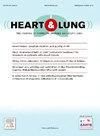The Effects of Exercise on Depression in Patients Diagnosed with Heart Failure with Preserved Ejection Fraction
IF 2.6
4区 医学
Q2 CARDIAC & CARDIOVASCULAR SYSTEMS
引用次数: 0
Abstract
Background
Millions of Americans are living with heart failure in the United States, and about 50% of those individuals have a preserved ejection fraction (HFpEF). Many patients living with heart failure may deal with managing depression. Depression, combined with HFpEF, puts individuals at risk for increased mortality rates and hospital admissions—making the management of these diseases of the utmost importance. Exercise is recommended for individuals with HFpEF. However, exercise to manage depressive symptoms in individuals with HFpEF has yet to be fully explored.
Aim
This systematic literature review aimed to examine the effects of exercise therapy on depression reported by individuals diagnosed with HFpEF.
Methods
A systematic literature search was conducted following the Preferred Reporting Items for Systematic Reviews and Meta-Analyses (PRISMA) methodology in five electronic databases: SPORTDiscus, PubMed, Cumulative Index to Nursing and Allied Health Literature, Academic Search Complete, and the Joanna Briggs Institute Evidence-Based Practice Database, using specific terms for research studies published between 2010 and 2024. The Joanna Briggs Institute critical appraisal tool was used to assess the quality of the included studies. Inclusion criteria consisted of original human subjects’ peer-reviewed research, studies that enrolled adults diagnosed with HFpEF, studies using exercise as a form of treatment, studies published in the English language, and studies that used depression as an outcome measure. Exclusion criteria consisted of nonhuman subjects research, studies with participants younger than 18 years of age, studies that did not include patients with HFpHF, studies that did not use exercise as a treatment, studies that used no valid measure of depression, or incomplete studies.
Results
Sixty-seven studies were identified, but only five (totaling 306 participants) met the inclusion criteria. Exercise therapy consisted of strength, endurance training, and Tai Chi. Depression was measured using various validated instruments: the Patient Health Questionnaire (PHQ-9), Geriatric Depression Scale-15, Profile of Mood States, and the Hare-Davis Cardiac Depression Scale. All five studies showed improved depression scores following exercise therapy, with four studies reporting statistically significant improvements. Depression scores improved significantly in four of the five included studies. Specifically, depression was reduced by 0.8 points (measured with the Geriatric Depression Scale-15), 2 points (measured with the PHQ-9 tool), 1.7 points (measured with the subscale of Depression in Profile of Mood State), and 3.95 points (measured with the PHQ-9) in these 4 studies. The fifth study demonstrated a 7-point improvement in depression (measured with the Hare-Davis Cardiac Depression Scale), though this change was not statistically significant.
Conclusions
The data from this systematic review suggests that exercise can be a practical approach to improving reported depressive symptoms among individuals with HFpEF. However, additional, more robust research is warranted to confirm these findings and determine the appropriate type and duration of exercise for maximum benefits.
运动对保留射血分数心力衰竭患者抑郁的影响
在美国,数以百万计的美国人患有心力衰竭,其中约50%的人有保留的射血分数(HFpEF)。许多患有心力衰竭的患者可能会处理抑郁症。抑郁症与HFpEF相结合,使个体面临死亡率和住院率增加的风险,因此对这些疾病的管理至关重要。建议HFpEF患者进行锻炼。然而,运动对控制HFpEF患者抑郁症状的作用尚未得到充分探索。目的本系统文献综述旨在探讨运动疗法对HFpEF患者抑郁症的影响。方法采用系统评价和荟萃分析首选报告项目(PRISMA)方法,在五个电子数据库中进行系统文献检索:SPORTDiscus、PubMed、护理和相关健康文献累积索引、学术检索完成和乔安娜布里格斯研究所循证实践数据库,使用2010年至2024年间发表的研究论文的特定术语。使用乔安娜布里格斯研究所的关键评估工具来评估纳入研究的质量。纳入标准包括原始人类受试者的同行评议研究,纳入诊断为HFpEF的成年人的研究,将运动作为一种治疗形式的研究,以英语发表的研究,以及将抑郁症作为结果衡量标准的研究。排除标准包括非人类受试者研究、参与者年龄小于18岁的研究、不包括HFpHF患者的研究、不使用运动作为治疗方法的研究、没有使用有效抑郁测量方法的研究或不完整的研究。结果共纳入67项研究,但只有5项(306名受试者)符合纳入标准。运动疗法包括力量、耐力训练和太极。抑郁症的测量使用了多种有效的工具:患者健康问卷(PHQ-9)、老年抑郁量表-15、情绪状态谱和Hare-Davis心脏抑郁量表。所有五项研究都表明,运动治疗后抑郁评分有所改善,其中四项研究报告了统计学上显著的改善。在五项纳入的研究中,有四项的抑郁评分显著提高。具体来说,在这4项研究中,抑郁症分别降低了0.8分(用老年抑郁症量表-15测量)、2分(用PHQ-9工具测量)、1.7分(用情绪状态抑郁量表测量)和3.95分(用PHQ-9测量)。第五项研究显示抑郁症改善了7分(用Hare-Davis心脏抑郁量表测量),尽管这一变化在统计上并不显著。结论:本系统综述的数据表明,运动可以是改善HFpEF患者所报告的抑郁症状的一种实用方法。然而,还需要更多的研究来证实这些发现,并确定适当的运动类型和持续时间,以获得最大的益处。
本文章由计算机程序翻译,如有差异,请以英文原文为准。
求助全文
约1分钟内获得全文
求助全文
来源期刊

Heart & Lung
医学-呼吸系统
CiteScore
4.60
自引率
3.60%
发文量
184
审稿时长
35 days
期刊介绍:
Heart & Lung: The Journal of Cardiopulmonary and Acute Care, the official publication of The American Association of Heart Failure Nurses, presents original, peer-reviewed articles on techniques, advances, investigations, and observations related to the care of patients with acute and critical illness and patients with chronic cardiac or pulmonary disorders.
The Journal''s acute care articles focus on the care of hospitalized patients, including those in the critical and acute care settings. Because most patients who are hospitalized in acute and critical care settings have chronic conditions, we are also interested in the chronically critically ill, the care of patients with chronic cardiopulmonary disorders, their rehabilitation, and disease prevention. The Journal''s heart failure articles focus on all aspects of the care of patients with this condition. Manuscripts that are relevant to populations across the human lifespan are welcome.
 求助内容:
求助内容: 应助结果提醒方式:
应助结果提醒方式:


